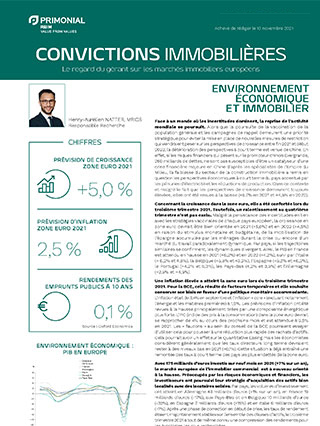Real Estate Convictions Europe : 1st quarter 2022
Just when the world was beginning to emerge from two years of health crisis, the Russian invasion of Ukraine has shaken up the economic cards, and the risk of major geopolitical fragmentation of the world has become real.
This division between blocks, if it happens, could have an impact over a long period of time. For the time being, global growth, which now stands at 3.6% in 2022, has been revised downwards due to the war in Ukraine and Western sanctions against Russia. Inflation, tightening monetary policies, the deteriorating health environment in China that will lead to new supply-chain difficulties, or the risk of a pandemic resurgence are all factors that pose significant uncertainties for activity in 2022.
With a conflict at its doorstep, Europe is returning to a high level of uncertainty. Eurozone growth has been revised downwards but remains in positive territory (+2.8%), impacted by more moderate consumption and industrial activity, as well as higher and longer inflation. However, it seems that this new crisis will not have the same impact on the European economies because of the disparity in the rise of energy and food prices, as well as a resurgence of supply constraints. The countries expected to underperform the Eurozone average are Finland (+1.5%), Germany (+2.0%), Belgium (+2.1%), and Austria (+2.4%), while Italy (+2.8%), France (+3.0%), the Netherlands (+3.2%), Ireland (+3.8%), Portugal (+4.8%) and Spain (+4.8%) are expected to outperform.
The double shock of Covid causing supply-chain bottlenecks, as well as the war in Ukraine and the energy and food crisis, have generated high inflation in the first quarter of 2022. The ECB must therefore navigate with the utmost caution between inflationary and recessionary risks, which could reinforce the stagflationary scenario. For the time being, inflation in the eurozone reached an all-time high of 7.5% in March. The CPI (consumer price index) in the eurozone has therefore been revised upwards, and is expected to reach 5.9% in 2022. The Frankfurt institution prefers to talk about a «normalisation» of its policy rather than a monetary tightening, even if this option is strengthened with two potential interest rate increases before the end of the year 2022 (+1.0%). This rise in rates would therefore mark the end of the era of negative returns, but not necessarily that of low rates. This scenario has already been anticipated by investors, as they have integrated an exit from the negative territory of rates, with results in an increasing spread between the various economies.
Against a backdrop of global stock market volatility, the European real estate market1 will have achieved an acceleration in the volume of investment, with €70 billion invested in the first quarter of 2022 (+18% year on yearyear on year). Due to the uncertain environment, investors continued their core strategy in the main European markets, while seeing new entry points for retail and hotels, which were corrected stronger than their fundamentals would justify. By major country, investment volumes reached 21.8 billion euros (+62%) in the United Kingdom, 12.1 billion euros in Germany (-12% year on year year on year), 9.6 billion euros in France (+15%), 3.4 billion euros in Italy (+121%), 2.7 billion euros in the Netherlands (-22%), and 2.2 billion euros in Spain (16%). Prime yields were again mostly stable in the first quarter of 2022. However, there was still a compression of yields for the most sought-after assets.
1 The real estate market refers to offices, retail, logistics, services and residential real estate for institutional clients.
Sources of data: CBRE, Eurostat, IMF, RCA, Oxford Economics..

The team

Henry-Aurélien Natter joined Praemia REIM as Research Manager in January 2018. He has the mission of developing the analyses of the Research & Strategy Department on the real estate markets, the economy and capital in France and in Europe.
Henry-Aurélien Natter began his career at Les Echos Etudes (formerly Eurostaf), then at C&W (formerly DTZ), and lastly at BNP PRE, where he acquired solid and varied experience in real estate research, strategy and finance. He is qualified with an AES degree in Business Management, a Masters Decree in management and SME management, and an International Master in commerce and marketing.
You may also like

- Market review
Real Estate Convictions : Q3 2024
In October 2024, the ECB announced its third consecutive rate cut to ease its restrictive monetary policy, and we believe that a new momentum has opened up for the European real estate market. Indeed, this quarter we have seen a thaw in certain real estate indicators.

- Market review
Real Estate Convictions : Q4 2024
The continued reduction in ECB interest rates, the level of savings amongst Europeans and the recovery of the real estate markets between 2022 and 2024 all point to the potential for improvement and a rebound in the sector.

- Market review
Real estate convictions : 1st quarter 2024
For now, European real estate professionals have been cautious and are watching for the tipping point that could occur with the announcement of the first change in direction by the ECB.


 et Firefox
et Firefox 